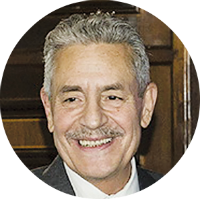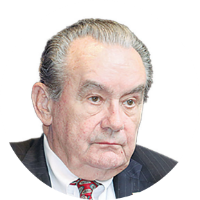Mohammad Zahoor sold the newspaper to Adnan Kivan, a millionaire businessman from Odesa and native of Syria on March 21. Kivan is the Kyiv Post’s third owner in the newspaper’s 23-year history.
Kivan’s main business is construction, but he also owns media assets in Odesa. Besides the Kyiv Post, he owns a local TV station Channel 7 and is associated, media watchers say, with the online Ukrainian Information Service.
Kyiv Post supporters raised concerns about what the new ownership will mean. Here is a sampling of the reaction.

Vitalii Sych, chief editor of Novoye Vremya media, and former Kyiv Post editor
“I got hired and worked for six years with a fantastic editorial team, with dozens of bright and professional colleagues, and with six main editors: Igor Greenwald, Askold Krushelnycky, Greg Bloom, Diana Elliott Fingal, Tom Warner and Brian Bonner. One of my editors-in-chief, Brian Bonner, is still the head of this newspaper. (On March 21) Odesa businessman with Syrian roots Adnan Kivan bought the newspaper. A friend of (lawmaker Sergei) Kivalov and former partner of (Odesa Mayor Gennadiy) Trukhanov. I hope it’s not the end of glorious history, but the beginning of the new one.”

Dmytro Gnap, an investigative journalist at Slidstvo.Info and Hromadske.TV
“I don’t feel very positive about it because there were questions to Zahoor as an owner. The editorial of the Kyiv Post had tried to protect the independence of the editorial policy and did it successfully. I don’t know if they will manage to do that with Kivan. So far, there is little information about Kivan’s plans. He is a very controversial person with an even more scandalous reputation than Zahoor.”

Tomas Fiala, CEO of Dragon Capital and owner of Novoye Vremya media
“As for implications of the purchase by Kivan, I don’t know him and don’t know what is the track record of his other media assets in terms of editorial independence. I consider the editorial team and Brian Bonner to be of high caliber, possibly the best in KP’s long history. Kivan must value it also very highly if he agreed to pay over $3.5 million for the business. There have been, however, rumors that some of the potential buyers were willing to pay more than market price in order to shut up the independent journalists of KP and limit their editorial freedoms ahead of next year’s elections, similar to the motives for acquisition of UMH by the Viktor Yanukovych family in 2013. We will see over the next months if the latter is the case. Hopefully not.”

Olena Sotnyk, a lawmaker from Samopomich Party
“The sale of the influential media that has always had an independent position towards the authorities and is trusted by foreign partners especially those who work in Ukraine or are connected to Ukraine raises not just suspicions, but concern. The main question today is if the editorial policy will be maintained because the loss of such a publication is a loss for people who think critically and want to dig deeper.”

Nataliya Bugayova, development director at the Institute for the Study of War in Washington, D.C., and ex-CEO at the Kyiv Post
“Kyiv Post’s importance to Ukraine goes far beyond it being the leading independent English-language publication. It has served as a beacon of ethical journalism maintaining the Western standards for over 23 years. It has produced generations of Ukrainian alumni who raised the overall bar of quality throughout the nation. It is critical for overall media in Ukraine that this is level of independence and high standards at Kyiv Post is preserved under new ownership”

Svitlana Zalishchuk, a lawmaker from Petro Poroshenko Bloc
“I am worried about how the deal will influence the editorial policy. The Kyiv Post is a very important media for Ukraine that has always influenced the international community and was an important source of information for diplomats and expats living in Ukraine.”

Oksana Romaniuk, acting director at the Institute Mass Information
“I hope that this change will not affect the Kyiv Post’s editorial and they will continue being an independent publication as they have been before. We know that Adnan Kivan owns media in Odesa and has a pro-Ukrainian position. We think that it is a commercial business decision. Maybe Kivan wants to influence the foreign audience.”

Reno Domenico, president of the Ukrainian chapter of Democrats Abroad and CEO of Sterling Business School
“Well, this is a very concerning development for all of us, not just expats, but all of us interested in progressive and free development of Ukraine. I would actually describe my concern as alarming, in that the Kyiv Post, for all it’s good days and bad days, has consistently been a voice for openness, honesty and truth. In fact, I had recently remarked to myself that I missed the old motto: Independence, Community, Trust. That’s what the Kyiv Post is to me, this city, and the country. This is not to say that I am passing judgement on the new ownership. Perhaps everything will be okay. It goes without saying that the current newsroom and leadership have been outstanding both from a news perspective, and from the point of view of those of us who have been in Ukraine for a long time, and are very concerned about freedom of the press.”

Melinda Haring, the editor of the UkraineAlert blog, the Atlantic Council’s most popular publication
“I’m very worried about the editorial independence of the Kyiv Post. I don’t know the new owner, but he’s already indicated that he retains the right to hire and fire a new chief editor. Replacing Brian Bonner would be a terrible mistake. There is no better newspaperman in Kyiv. He is honest, decent, kind and absolutely fearless. We need more courageous editors like Bonner in Kyiv, especially before the 2019 elections.”

Natalie Sedletska, an author and editor of the investigative TV-program “Schemes. Corruption in Detail,” run on Radio Free Europe/Radio Liberty
“This is very disturbing news because this newspaper today is one of the few islands of high-quality free press in the country. Any attempts to change the editorial policy are unacceptable, however, taking into account the identity of the new owner, unfortunately can’t be ruled out. I think it is very important that Brian Bonner remains the chief editor. His reputation proves that at this position he could defend the newspaper’s independence.”

Morgan William, president of U.S.-Ukraine Business Council
“The international private business community wishes to thank Mohammad Zahoor for his outstanding support of the Kyiv Post for many years. They also wish to thank the staff of the Post for their great work. Together they have kept the Kyiv Post a strong, independent, truthful newspaper… Ukraine’s global voice. To them ‘freedom of the press’ was not just a concept but a reality. The private business community is not very familiar with the new owner and know very little about his reasons for investing in the Post or his plans for the future. The private business community will be watching carefully and certainly hope the Kyiv Post will continue to be a strong, independent, truthful, global voice for Ukraine.”

Drew Sullivan, a co-founder of Organized Crime and Corruption Reporting Project
“The ownership of commercial media in our region is very problematic and any change makes us very concerned that readers will lose another independent voice. The new owner should be given a chance to demonstrate their commitment to independence by not making any significant changes to a very good staff and by not interfering with their editorial independence. Unfortunately most owners in this region see media as their own personal vanity press and not as the public service that it is.”

Alex Ryabchin, a lawmaker from Batkivshchyna Party
“I love Kyiv Post and I know that it’s the most credible source for many foreigners that follow events in Ukraine. Before becoming a lawmaker, I worked for the Washington Post. I recently was in Washington and I stopped by the Washington Post office. I asked one of their journalists how often they see their owner Jeff Bezos, the richest man in the world. I was surprised when they answered that they saw him only once in their life and they don’t feel any of his influence on the publication’s editorial policy. Unfortunately, it’s quite different in Ukraine. I hope it’s the first and the last time I am asked about the owner of the publication, and the journalists and editors of the Kyiv Post will continue adhering to the highest standards of journalism.”

Katya Gorchinskaya, CEO of Hromadske TV and former deputy chief editor of Kyiv Post
“I think it’s very disturbing. I think we’re about to see the end of a big era of the Kyiv Post. The declared price of the deal has no relation to the market value of the asset purchased, which suggests two possible motives: The buyer is either a huge philanthropist and long-time fan of the Kyiv Post who wants to support it as a community service, or there are political and/or business motives. The prior biography of Kivan does not seem to be rich with charity activities, and the fact that the Kyiv Post has been loss-making roughly since 2008 rules out pure business motives. But I hope my research has been too superficial and I am mistaken in this.
What is also extremely alarming is the number of stories about his alleged dirty business practices and partners – a simple search of Kivan’s name produces a plethora of stories about scandals surrounding his construction business – bad news for the Kyiv Post because the paper would actually have to cover those kind of issues, and it will be a real test for editorial freedom and strain on the relationship with the owner from day 1.”

Marko Suprun, a host of the “StopFake” TV program
“Western media organizations often have their news about Ukraine delivered through Moscow bureaus, which has left readers with a skewed understanding of Ukraine to put it mildly. While in Ukraine, most (but not all) media organizations and their editorial staff do not always serve the interests of a free press but are more often than not prisoners to oligarchic interests having instead become institutes of churnalism. The nexus between business and journalism, like that of money and politics, can be potentially degenerative for a society in any country. Investing time, energy and human capital to inculcate a culture of original stories, fact-checking and most importantly, an independent editorial room, is that confluence of creativity capable of safeguarding the development of a mature nation state. It is critically important to Ukraine for the Kyiv Post to continue this tradition.”

Otar Dovzhenko, a media reviewer, editor, lecturer at the School of Journalism in Ukrainian Catholic University
It is unlikely it’s connected to the (presidential) elections.
A businessman, who has assets in Ukraine and potential problems with the authorities, may need self-defense: law enforcement will think twice whether to touch him and his business, knowing that all diplomatic missions, managers of large companies will immediately find out about it (from the Kyiv Post). I have reason to believe that the condemnation and rejection of Western partners are one of the few things that can keep current government within the bounds of decency. Therefore, such publication is something like an emergency button for the owner.

Randall Smith, professor at the Missouri School of Journalism and president of the Alfred Friendly Press Partners
“The Kyiv Post is a beacon of high-quality journalism in Ukraine. Our hope is that the new ownership respects the integrity of the staff and the independence of the publication. Public trust takes decades to build. It is priceless. Public trust can be killed overnight, and a publication can quickly become worthless. I personally know several members of The Kyiv Post staff, and my hope is for a successful transition to a new owner. We will be watching carefully and with concern.”
